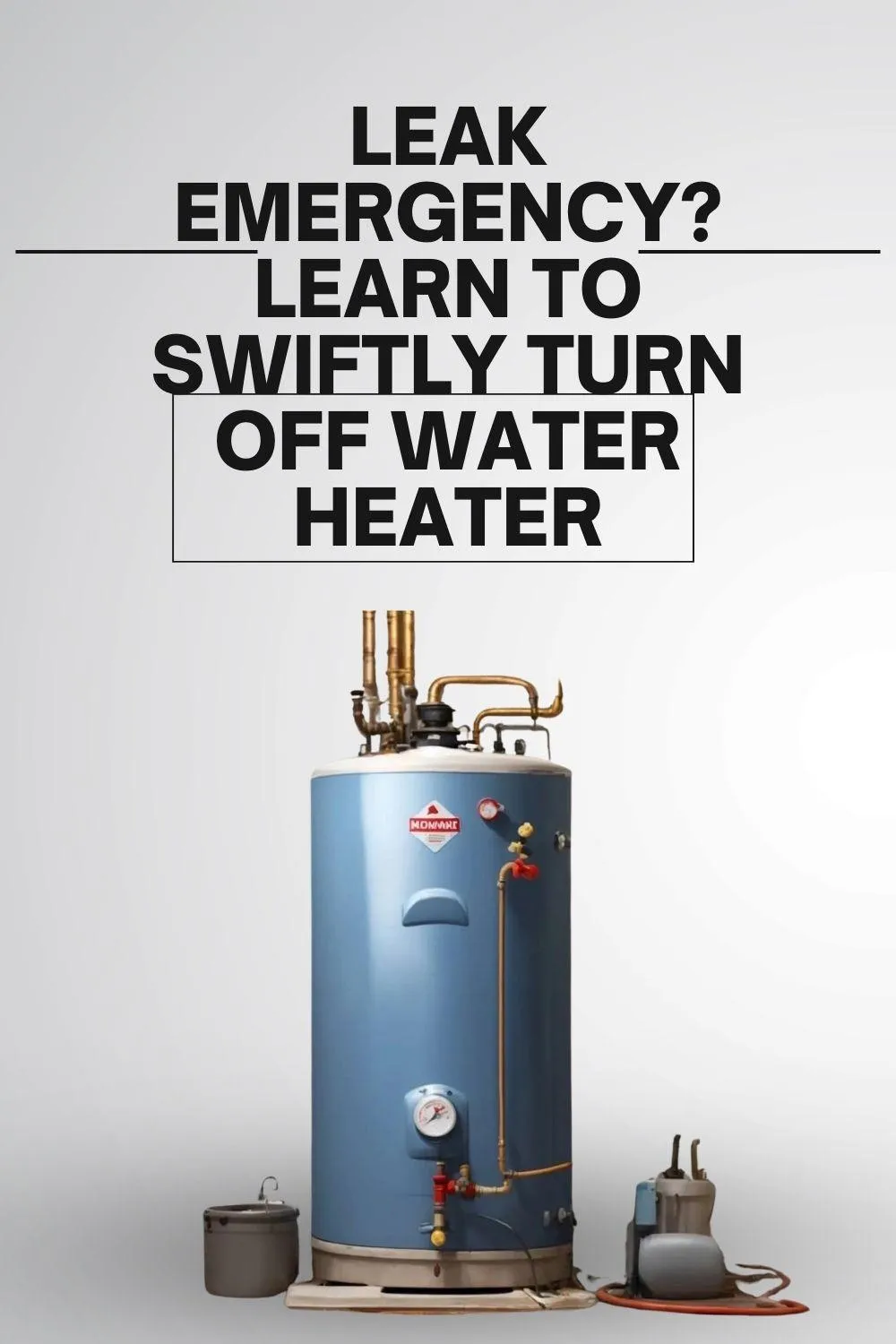
Leak Emergency? Learn to Swiftly Turn Off Water Heater
Leak Emergency? Learn to Swiftly Turn Off Water Heater
Introduction:
Setting the Scene: Understanding the Importance of a Swift Response
In the event of a water heater leak, time is of the essence. A swift response can prevent extensive damage to your home and belongings. Understanding the urgency of the situation is crucial to taking prompt action and minimizing the impact of the leak.
In this comprehensive guide, we'll delve into the intricacies of handling a water heater leak. From understanding the basics of your water heater to learning how to swiftly turn it off in an emergency, we'll cover everything you need to know to handle the situation effectively and prevent further damage.

Understanding Your Water Heater
The Basics: How a Water Heater Works
Before diving into emergency procedures, it's essential to grasp the fundamentals of how your water heater operates. Whether it's a traditional tank-style heater or a modern tankless model, understanding the inner workings of your unit will better equip you to address any issues that arise.
Types of Water Heaters: Gas, Electric, Tankless
Water heaters come in various types, each with its own set of characteristics and maintenance requirements. Whether you have a gas-powered heater, an electric model, or a tankless unit, knowing the specific features of your water heater is essential for effective troubleshooting.
Identifying Components: Thermostat, Pressure Relief Valve, Drain Valve
To effectively address a leak, you must be familiar with the key components of your water heater. From the thermostat that regulates temperature to the pressure relief valve that prevents over-pressurization, understanding these elements will aid in diagnosing and resolving issues.
Recognizing Signs of a Leak
Visual Cues: Drips, Puddles, and Moisture
One of the most apparent signs of a water heater leak is the presence of water around the unit. Whether you notice drips, puddles, or moisture accumulation, these visual cues indicate a potential problem that requires immediate attention.
Auditory Signals: Hissing or Sizzling Sounds
In addition to visual signs, leaks can also manifest through auditory signals. Hissing or sizzling sounds may indicate water escaping from the unit or coming into contact with heated surfaces, highlighting the urgency of the situation.
Smelling Trouble: Detecting Odd Odors
Unusual odors, such as a sulfuric or metallic smell, can also indicate a water heater leak. These odors may result from chemical reactions occurring within the unit or the presence of stagnant water, signaling the need for prompt investigation.
Safety Precautions
Prioritizing Safety: Why it's Essential Before Taking Action
Before attempting to address a water heater leak, prioritizing safety is paramount. Shutting off power or gas supplies, wearing protective gear, and ensuring proper ventilation are crucial steps to prevent accidents and injuries during the process.
Turning Off Power: Steps for Electric Water Heaters
For electric water heaters, turning off the power supply is the first step in safely addressing a water heater leak. This involves locating the appropriate circuit breaker or fuse and deactivating the power to the unit to eliminate the risk of electric shock.
Shutting Off Gas Supply: Essential for Gas Water Heaters
If you have a gas-powered water heater, shutting off the gas supply is essential to prevent leaks and potential hazards. Knowing how to safely close the gas valve and ventilate the area will minimize the risk of gas-related incidents during an emergency.
Steps to Swiftly Turn Off a Water Heater
Step 1: Locate the Water Heater
The first step in addressing a water heater leak is locating the unit within your home. Whether it's situated in the basement, garage, or utility closet, knowing the precise location of the water heater will expedite the response process in an emergency.
Step 2: Shut Off the Water Supply
Once you've located the water heater, the next step is to shut off the water supply. This involves locating the main shut-off valve and turning it clockwise to stop the flow of water to the unit, preventing further leakage and damage.
Step 3: Turning Off the Power or Gas
Depending on the type of water heater you have, you'll need to either turn off the power or shut off the gas supply to the unit. Following the appropriate steps for your specific setup will ensure safe operation and prevent accidents during the shutdown process.
Step 4: Draining the Tank Safely
After shutting off the water and power/gas supplies, it's essential to drain the tank to minimize the risk of further leakage. Following manufacturer guidelines and using proper drainage techniques will help facilitate a safe and effective shutdown process.
Additional Tips for a Smooth Shutdown
Acting Quickly: Why Time is of the Essence
In a water heater leak emergency, acting quickly can make all the difference in minimizing damage and preventing costly repairs. Don't delay in addressing the issue – swift action is key to mitigating the impact of the leak on your home and belongings.
Staying Calm: Keeping a Level Head in an Emergency
While a water heater leak can be stressful, it's essential to remain calm and focused during the shutdown process. Panicking or becoming overwhelmed can impede your ability to effectively address the situation, so take a deep breath and approach the task methodically.
Having the Right Tools: Essential Equipment for the Task
Before attempting to shut off your water heater, ensure you have the necessary tools and equipment on hand. From wrenches and screwdrivers to flashlights and safety gloves, having the right gear will facilitate a smooth and safe shutdown process.
What Not to Do in a Leak Emergency
Avoiding Common Mistakes: Why Certain Actions Can Worsen the Situation
In a water heater leak emergency, it's crucial to avoid common mistakes that can exacerbate the problem. From ignoring warning signs to attempting DIY repairs without proper knowledge, certain actions can worsen the situation and lead to additional damage.
Neglecting Safety Precautions: The Risks of Ignoring Safety Measures
Safety should always be the top priority when addressing a water heater leak. Neglecting safety precautions, such as failing to shut off power or gas supplies, can result in accidents, injuries, or even fatalities. Always prioritize safety to protect yourself and your loved ones.
Skipping Maintenance: How Regular Checks Can Prevent Emergencies
Regular maintenance is key to preventing water heater leaks and other plumbing emergencies. By scheduling annual inspections, flushing the tank, and addressing minor issues promptly, you can prolong the lifespan of your water heater and avoid costly repairs down the line.
After Turning Off the Water Heater
Assessing the Damage: Evaluating the Extent of the Leak
Once you've successfully shut off your water heater, it's time to assess the damage and determine the next steps. Inspect the area around the unit for signs of water damage, such as warped flooring or water stains, and document any visible issues for insurance purposes.
Contacting Professionals: When to Seek Expert Assistance
While you may be able to handle the initial shutdown process yourself, certain situations may require the expertise of a professional plumber or water damage restoration specialist. If you're unsure how to proceed or encounter complications during the shutdown process, don't hesitate to seek expert assistance.
Cleanup and Recovery: Steps to Restore Normalcy
After addressing the immediate threat posed by the water heater leak, it's essential to begin the cleanup and recovery process. This may involve drying out affected areas, repairing any damage to flooring or walls, and taking steps to prevent mold growth and structural issues.
Preventive Measures for Future Emergencies
Regular Inspections: Why Proactive Maintenance is Key
To prevent future water heater leaks and emergencies, make a habit of conducting regular inspections and maintenance checks. This includes checking for signs of corrosion, testing pressure relief valves, and flushing the tank to remove sediment buildup.
Knowing When to Call for Help: Signs it's Time to Bring in a Professional
While DIY maintenance is essential, certain issues may require the expertise of a professional plumber or HVAC technician. If you notice signs of trouble such as inconsistent water temperature, unusual noises, or frequent leaks, don't hesitate to contact a qualified professional for assistance.
Emergency Preparedness: Creating a Plan for Unexpected Situations
In addition to regular maintenance, it's essential to have an emergency preparedness plan in place for unexpected situations. This may include knowing the location of shut-off valves, keeping emergency contact information handy, and practicing evacuation procedures with your family.
Conclusion
Recap of Key Points
In summary, addressing a water heater leak requires swift action, careful attention to safety precautions, and knowledge of your unit's components and operation. By following the steps outlined in this guide and prioritizing preventive maintenance, you can effectively handle emergencies and minimize the risk of future leaks.
Empowering Readers: Encouragement to Apply the Knowledge Learned
Armed with the information and guidance provided in this article, readers can approach water heater leaks with confidence and competence. By staying informed, proactive, and prepared, you can safeguard your home and loved ones against the potentially devastating effects of water damage.
Call To Action
If you encounter a water heater leak or any other appliance issue, don't hesitate to contact Zip Appliance Repair and Service. Visit our website at www.ziprepairservice.com or call us at (661) 387-2282 for prompt and professional assistance. Your satisfaction is our priority, and we're here to help you keep your home running smoothly.
